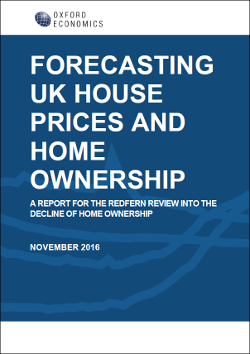Ungated Post | 06 Dec 2016
Forecasting UK House Prices and Home Ownership

This report sets out a new approach to modelling the macroeconomic drivers of house prices and home ownership based on data from 1992 to 2014. This approach enables us to explore the drivers, outlook and policy options for the housing market in a more comprehensive way than most past studies. Our results illustrate how sensitive house prices and home ownership rates are to a range of different macroeconomic drivers, including the supply of housing, the cost of capital and people’s incomes. The report also diagnoses the underlying causes of recent trends—why have prices risen and why has the home ownership rate dropped? The answers are somewhat surprising in the context of the current public debate around housing, and have important implications for the appropriate policy response.
Oxford Economics’ team is expert at applying advanced economic tools that provide valuable insights into today’s most pressing business, financial, and policy issues.
To find out more about our capabilities, contact:
Americas
Diantha Redd
+1 (646) 503 3052
Email
Asia Pacific
Peter Suomi
+65 6850 0110
Email
EMEA
Aoife Pearson
+44 (0)203 910 8054
Email
Related Services

Post
KPMG M&A Outlook 2026: Between Uncertainty, Resilience, and Seizing Opportunities
Discover how Germany’s M&A landscape is evolving – with a focus on growth, AI and post-merger value creation.
Find Out More
Post
Silver, the next generation metal
This report highlights the critical role silver plays in data centres and artificial intelligence (AI), automotive and electric vehicles (EVs), and solar energy photovoltaics (PVs). With these sectors expected to expand significantly over the coming years, we expect future silver demand to be strong.
Find Out More
Post
Powering the UK Data Boom: The Nuclear Solution to the UK’s Data Centre Energy Crunch
The UK’s data centre sector is expanding rapidly as digitalisation, cloud computing, and artificial intelligence (AI) drive surging demand for high-performance computing infrastructure.
Find Out More